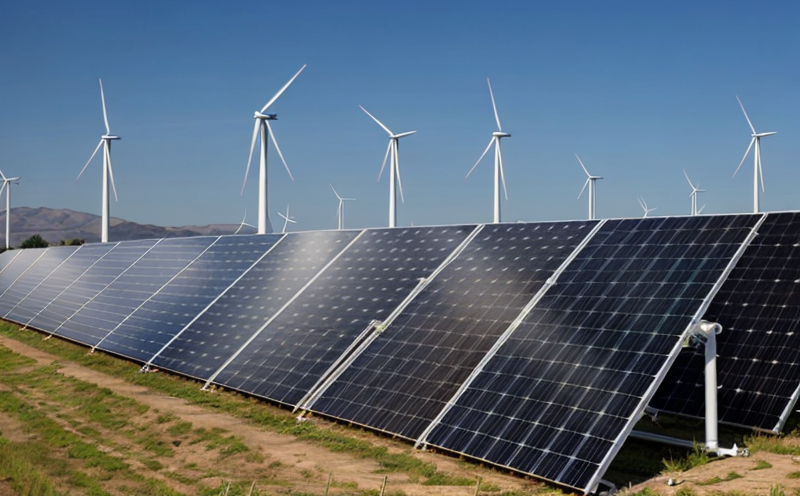IEC 62282 Fuel Cell Safety and Performance Testing
The International Electrotechnical Commission (IEC) Standard 62282 is a comprehensive framework designed to ensure the safety, performance, and reliability of fuel cells used in renewable energy systems. This standard covers various aspects including electrical performance, mechanical integrity, thermal management, and operational stability. It aims to protect both end-users and operators from potential hazards while optimizing system efficiency.
Fuel cells are critical components in modern renewable energy solutions such as hydrogen-based power generation and transportation. They convert chemical energy directly into electricity without combustion, making them environmentally friendly and efficient alternatives to conventional fossil fuel sources. However, the safe operation of these systems is paramount for widespread adoption and integration into existing infrastructures.
The IEC 62282 standard encompasses a wide array of tests that are crucial for validating the safety and performance characteristics of fuel cells. These include electrical impedance measurements, pressure cycling durability tests, hydrogen leakage checks, thermal runaway assessments, and more. Each test serves to identify potential weaknesses in design or manufacturing processes early on, thereby enhancing overall product quality.
For instance, during an electrical impedance measurement, the resistance offered by different parts of the fuel cell is evaluated under various loading conditions. This helps determine whether there are any internal shorts or excessive losses that could lead to inefficiencies or even failures over time. Similarly, pressure cycling durability tests simulate real-world operating environments where fuel cells may experience cyclic pressures due to temperature changes and humidity variations.
The importance of such rigorous testing cannot be overstated. By adhering strictly to IEC 62282 guidelines, manufacturers can ensure their products meet stringent international standards, thus gaining market acceptance and fostering trust among consumers. Additionally, compliance with these regulations often translates into enhanced safety features for end-users who rely on reliable power supplies in critical applications like emergency lighting systems or backup generators.
In summary, IEC 62282 provides a robust foundation for assessing the reliability and safety of fuel cell technologies within renewable energy ecosystems. Through meticulous evaluation processes focused on both technical specifications and practical considerations, this standard ensures that high-quality products are consistently produced across diverse industries worldwide.
Applied Standards
The IEC 62282 series is part of a broader set of international standards aimed at promoting interoperability, safety, and efficiency in fuel cell technology. Specifically, it includes several sub-standards that address different facets of fuel cell development and deployment:
- IEC 62282-1: General requirements for hydrogen and fuel cell systems.
- IEC 62282-3: Electrical performance testing.
- IEC 62282-4: Hydrogen leakage detection methods.
- IEC 62282-5: Mechanical integrity tests.
- IEC 62282-7: Safety considerations for hydrogen and fuel cell systems in specific applications like vehicles, residential installations, etc.
- IEC 62282-10: Testing procedures for performance under different operating conditions.
These standards work together to create a comprehensive framework that covers every aspect of fuel cell technology from initial design through final installation and maintenance. Compliance with these internationally recognized specifications not only ensures adherence to best practices but also enhances the credibility of companies involved in this rapidly growing sector.
Environmental and Sustainability Contributions
Fuel cells play a vital role in advancing sustainable energy solutions by reducing reliance on non-renewable resources while minimizing environmental impact. By leveraging hydrogen as an energy carrier, fuel cell systems contribute significantly towards achieving carbon-neutral goals set forth by governments around the globe.
One key advantage of using IEC 62282 for testing purposes is that it helps manufacturers meet stringent emission limits prescribed by regulatory bodies worldwide. For example, in automotive sectors, compliance with these standards ensures that vehicles powered by fuel cells emit very low levels of pollutants compared to traditional internal combustion engines. This reduction in greenhouse gas emissions supports global efforts aimed at combating climate change.
Moreover, IEC 62282 promotes resource efficiency throughout the lifecycle of fuel cell products. From raw material sourcing to end-of-life recycling, this standard encourages practices that minimize waste and maximize recyclability. Such approaches not only benefit the environment but also contribute positively to corporate social responsibility initiatives undertaken by many companies operating within this industry.
By adopting IEC 62282 as part of their quality assurance protocols, organizations involved in fuel cell technology can demonstrate a commitment to sustainability that resonates well with environmentally conscious stakeholders. This alignment between product performance and environmental responsibility helps foster long-term partnerships and customer loyalty, ultimately driving growth within this promising market segment.
Competitive Advantage and Market Impact
Adopting IEC 62282 offers significant competitive advantages for businesses operating within the renewable energy sector. Here are some key benefits:
- Increased Trustworthiness: Compliance with internationally recognized standards builds trust among consumers, investors, and regulatory bodies.
- Better Product Quality: Rigorous testing ensures that fuel cell systems perform reliably under all specified operating conditions.
- Enhanced Safety Features: By identifying potential hazards early in the development process, companies can incorporate advanced safety measures into their products.
- Market Differentiation: Offering superior performance and reliability compared to competitors can attract premium pricing and higher customer satisfaction ratings.
- Potential for New Markets: Meeting stringent international standards opens up opportunities for exporting innovative solutions to countries with robust regulatory frameworks.
- Strengthened Supplier Relationships: Partnering with reputable labs that follow IEC 62282 protocols strengthens relationships and enhances reputation within the supply chain.
In conclusion, embracing IEC 62282 not only meets regulatory requirements but also positions companies at the forefront of technological advancement in renewable energy systems. This proactive approach fosters innovation, drives efficiency improvements, and ultimately contributes to a greener future for everyone involved.





